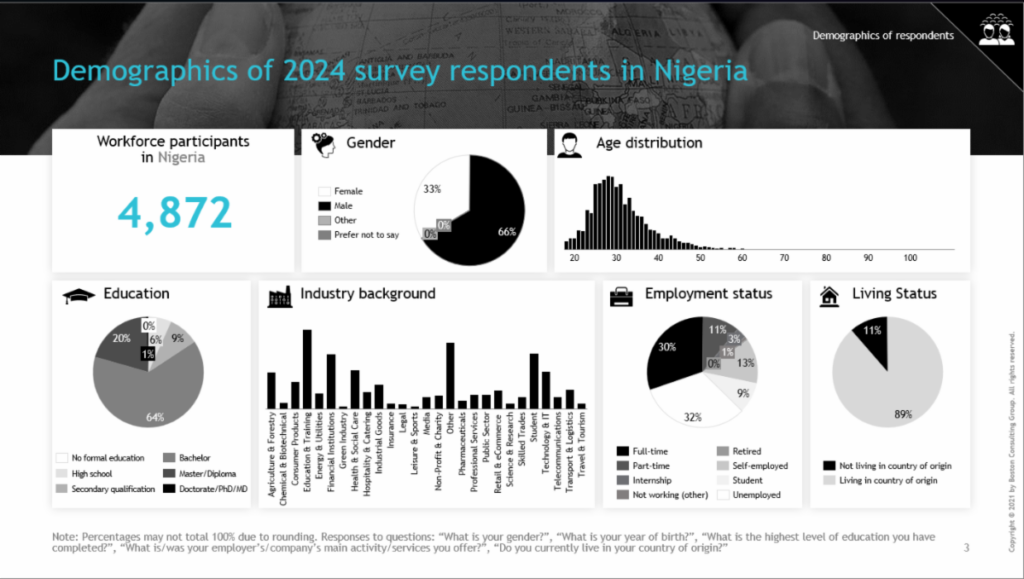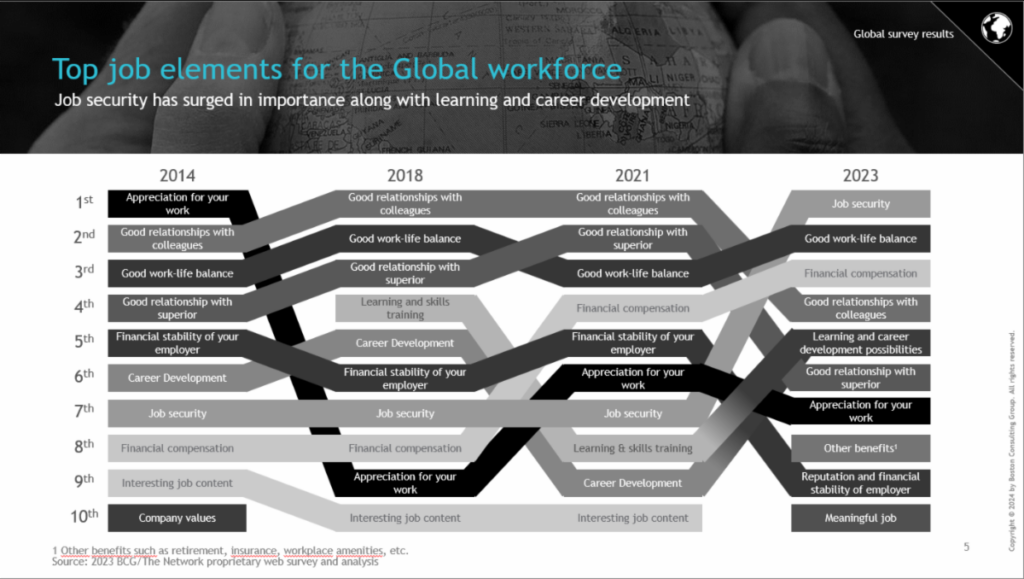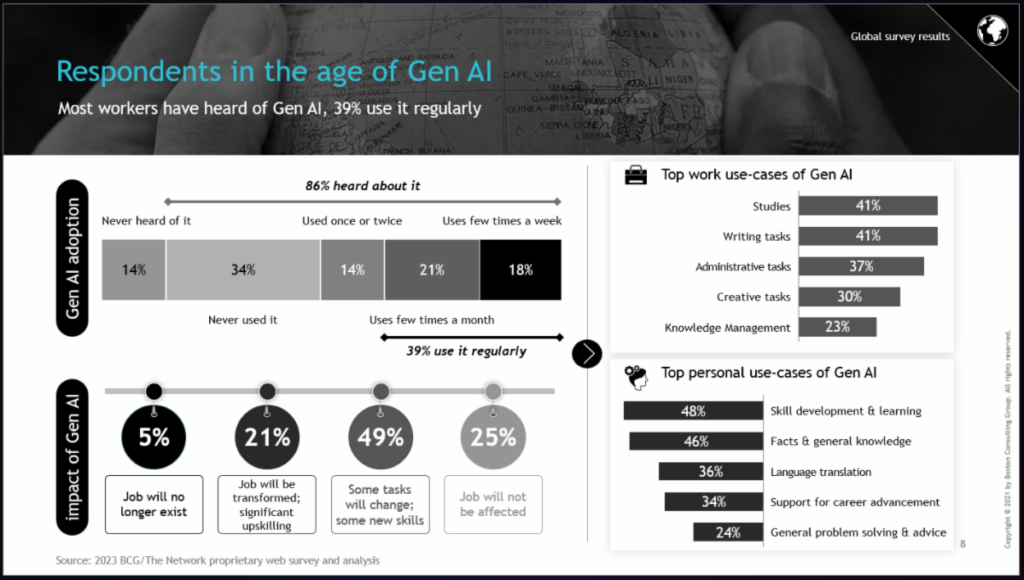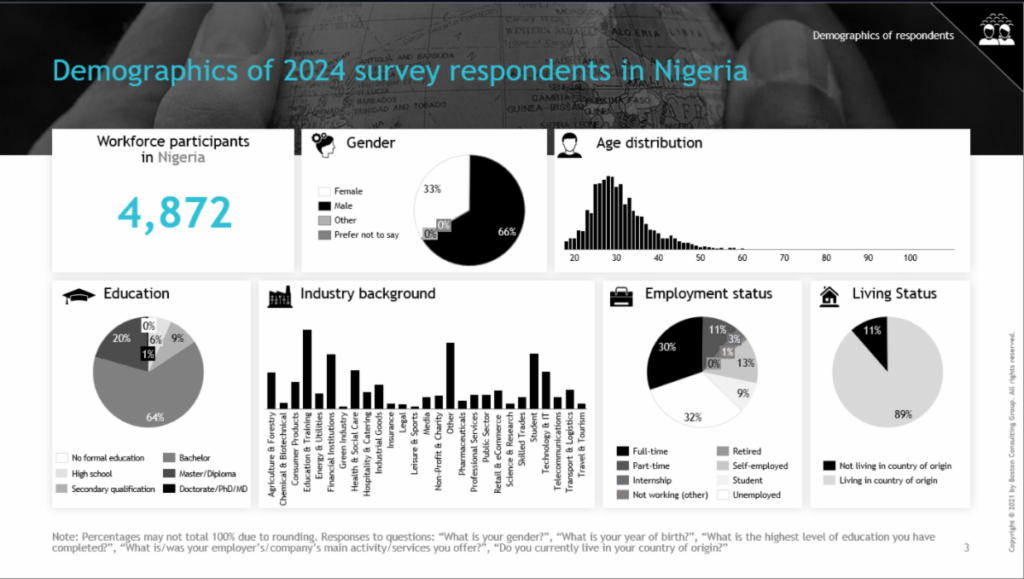- A new report from BCG, The Network, The Stepstone Group, and local partner The African Talent Company (TATC) based on a survey of more than 150,000 respondents in 188 countries reveals shifting workplace priorities and preferences.
- Three-quarters of respondents believe GenAI will create some level of disruption, and three-quarters of Nigerians and Ghanaians are willing to reskill.

LAGOS, Nigeria, 06 August 2024 -/African Media Agency (AMA)/- Three-quarters of workers around the world believe GenAI will bring some level of disruption to the workplace. Despite uncertain times, they remain confident about their place in the labour market with 75% of Nigerians and Ghanaians willing to be retrained in any case and 23% if necessary to stay ahead in their careers. Seventy-four percent of Nigerians and 73% of Ghanaians feel they hold the upper hand when negotiating for jobs as opposed to 64% of their global counterparts.
These are among the findings of a new report published today by Boston Consulting Group (BCG), The Network, The Stepstone Group, and local partner The African Talent Company (TATC). Titled How Work Preferences Are Shifting in the Age of GenAI, the study is based on survey data from more than 150,000 workers from 188 countries and is the second instalment in the 2024 edition of the Decoding Global Talent series, the previous editions having been published in 2014, 2018, and 2021.
Join our WhatsApp ChannelThe findings of the study underscore the proactive approach workers are taking in response to the potential impacts of GenAI. By prioritising reskilling and development, they are not only preparing to adapt to technological changes but also expressing confidence in their ability to thrive in an evolving labour market. This adaptability is key to maintaining a robust and resilient workforce in the face of ongoing technological advances.

“In both Ghana and Nigeria, we are witnessing an evolution and maturation in employee perspectives on AI, along with an important understanding that reskilling is essential for long-term employability,” said Adwoa Banful, Principal at BCG, Johannesburg.
In both countries, workers have demonstrated clarity regarding their expectations regarding AI in the workplace. Globally, 54% and in Ghana, 35% and Nigeria, 30%, would refuse an attractive job offer if they had a bad experience during the interview process. The importance of the recruitment process is underscored by the fact that a negative experience during recruitment is the second-most-significant dealbreaker in North America and Europe. With only 24% of Ghanaians and 20% of Nigerians who consider a negative experience during recruitment as a dealbreaker, this ranks lower than employers that don’t offer family-friendly benefits (39% for Ghanaians and 33% for Nigerians); employers with products or services that have a negative impact on society (64% for Ghanaians and 53% for Nigerians) and organisations that don’t have a diverse or inclusive environment (36% for Ghanaians and 31% for Nigerians). Additionally, 40% of workers globally, and 45% locally agree that they won’t work for companies that don’t offer mental health support.
“AI offers a unique opportunity to transform recruitment through innovative, technology-driven processes. Moreover, AI has the potential to substantially enhance skill development and foster a genuinely human-centric workplace,” said Sebastian Dettmers, CEO of The Stepstone Group. “This evolution will streamline operations, removing redundant tasks and significantly aiding individuals in securing the ideal job.”

Interestingly, the impact of AI disruption is evident in what global talent desires in an ideal workplace. Job security was the most important factor for workers in East Asia and South Asia, particularly among those who perceived AI to have a greater impact on their future work. Learning and development topped the list for the Middle East and North Africa, sub-Saharan Africa, and Latin America, highlighting a strong desire to adapt, progress, and upskill in an evolving landscape. The highly competitive labour markets of recent years and the strong bargaining position of workers are reflected in financial compensation being the top priority for North Americans and work-life balance for Europeans. The three most important considerations for the West African workforce are: Job security, learning and career development, and opportunities to lead and take responsibility for Ghanaians and for Nigerians they are learning and career development, job security, and a creative environment.
“In a competitive labour market where talent is a critical and scarce commodity, it’s crucial for employers to source talent from diverse channels and resources,” said Banful. “Organisations should increasingly consider reskilling current employees, recruiting talent internationally, or seeking individuals with unconventional backgrounds as viable solutions.”
Download the publication here.
More insights about the survey here.
Distributed by African Media Agency (AMA) on behalf of Boston Consulting Group (BCG).
The Network: Bojan Divčić—Bojan.Divcic@the-network.com
The Stepstone Group: Frank Brandmaier—Frank.Brandmaier@stepstone.com
About the Survey
BCG, The Network (together with its affiliate organizations), and The Stepstone Group conducted this anonymous online survey from October through December 2023. All told, 150,735 people in 188 countries participated.
The survey elicited respondents’ preferences at work and their perception of GenAI and its impact. It covered topics such as evolving work preferences and attitudes, factors that might lead respondents to reject an attractive job offer, the extent to which they have adopted and now use GenAI in professional and personal contexts, perceptions of GenAI’s impact on their jobs, and willingness to reskill to remain competitive. The data gathered in the survey—including a wide variety of information on participants’ demographic and professional backgrounds—enabled us to analyse workers’ attitudes on the basis of multiple parameters.
BCG also conducted follow-up interviews with select study participants around the world—many of whom were interviewed before and have been followed for several years.
About Boston Consulting Group
Founded in 1963, and with offices in over 50 countries, BCG’s diverse, global team comprising of 30 000 plus people bring deep industry and functional expertise and a range of perspectives that provide clients with management consulting solutions. Through its transformational approach aimed at benefiting all stakeholders, BCG empowers organisations to grow, build sustainable competitive advantage and drive positive societal impact. For more, go to www.bcg.com.
BCG is well established in Africa, with offices in: Cairo, Casablanca, Johannesburg, Lagos, and Nairobi, bringing together a team of nearly 600 collaborators. For more about BCG in Africa, go to www.bcg.com/Africa.
About The Network
The Network is a global alliance of more than 70 leading recruitment websites committed to finding the best talent in over 150 countries. Founded in 2002, The Network has become the global leader in online recruitment, serving more than 2,000 global corporations. The recruitment websites in The Network attract almost 200 million unique visitors each month. For more information, please visit www.the-network.com.
About The Stepstone Group
The Stepstone Group is a leading global digital recruitment platform that connects companies with the right talent and helps people find the right job. The Stepstone Group connects more than 130 million job applications with around 140,000 employers every year. With its integrated platforms, The Stepstone Group simplifies the candidates job search as well supporting recruiters with AI-powered solutions for the entire recruitment process. In 2023, The Stepstone Group generated revenue of around €1 billion. The Stepstone Group operates in more than 30 countries—including Stepstone in Germany, Appcast in the US, and Totaljobs in the UK. The company is headquartered in Düsseldorf, Germany and employs around 4,000 people worldwide. For more information: www.thestepstonegroup.com/en.
The post West African talent is ready to embrace reskilling amid GenAI advances. appeared first on African Media Agency.
Source : African Media Agency (AMA)

















Follow Us